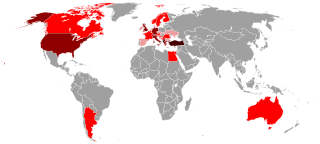
The Albanians are an ethnic group native to the Balkan Peninsula who share a common Albanian ancestry, culture, history and language. They primarily live in Albania, Kosovo, North Macedonia, Montenegro, Serbia as well as in Croatia, Greece, Italy and Turkey. They also constitute a large diaspora with several communities established across Europe, the Americas and Oceania.

The Balkans, corresponding partially with the Balkan Peninsula, is a geographical area in southeastern Europe with various geographical and historical definitions. The region takes its name from the Balkan Mountains that stretch throughout the whole of Bulgaria. The Balkan Peninsula is bordered by the Adriatic Sea in the northwest, the Ionian Sea in the southwest, the Aegean Sea in the south, the Turkish straits in the east, and the Black Sea in the northeast. The northern border of the peninsula is variously defined. The highest point of the Balkans is Musala, 2,925 metres (9,596 ft), in the Rila mountain range, Bulgaria.
During classical antiquity, Albania was home to several Illyrian tribes such as the Albanoi, Ardiaei, Bylliones, Dassaretii, Enchele, Labeatae, Taulantii, Parthini, Penestae, Amantes, and many others, but also Bryges and Epirote tribes, as well as several Greek colonies established on the Illyrian coast in cooperation with the local Illyrians, notably Epidamnos-Dyrrhachium and Apollonia.
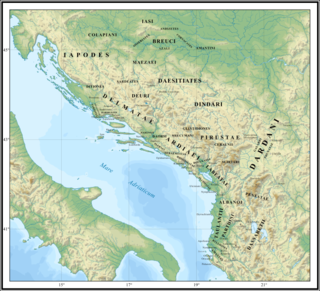
In classical antiquity, Illyria was a region in the western part of the Balkan Peninsula inhabited by numerous tribes of people collectively known as the Illyrians.

Albanian culture or the culture of Albanians is a term that embodies the artistic, culinary, literary, musical, political and social elements that are representative of Albanians. Albanian culture has been considerably shaped by the geography and history of Albania, Kosovo, parts of Montenegro, parts of North Macedonia, and parts of Northern Greece, traditional homeland of Albanians. It grew from that of the Paleo-Balkan cultures, including Proto-Albanian, Illyrian, Thracian, Dacian, with their pagan beliefs and specific way of life in the wooded areas of far Southern Europe. Albanian culture has also been influenced by the Ancient Greeks, Romans, Byzantines and Ottomans.

Zog I was the leader of Albania from 1922 to 1939. At age 27, he first served as Albania's youngest Prime Minister ever (1922–1924), then as president (1925–1928), and finally as king (1928–1939).
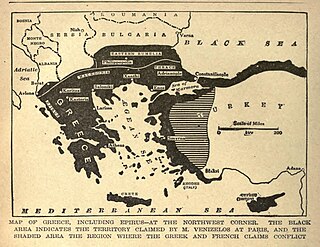
The Megali Idea is a nationalist and irredentist concept that expresses the goal of reviving the Byzantine Empire, by establishing a Greek state, which would include the large Greek populations that were still under Ottoman rule after the end of the Greek War of Independence (1821–1829) and all the regions that had large Greek populations.

The Two Georges is an alternate history and detective thriller novel co-written by science fiction author Harry Turtledove and Oscar-winning actor Richard Dreyfuss. It was originally published in 1995 by Hodder & Stoughton in the United Kingdom, and in 1996 by Tor Books in the United States, and was nominated for the 1995 Sidewise Award for Alternate History.
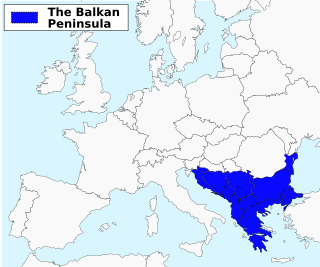
The Balkans and parts of this area are alternatively situated in Southeastern, Southern, Eastern Europe and Central Europe. The distinct identity and fragmentation of the Balkans owes much to its common and often turbulent history regarding centuries of Ottoman conquest and to its very mountainous geography.

Otto Witte was a German circus acrobat and fantasist who said that he managed to be crowned King of Albania.

Christianity in Albania was established throughout the country in 325 AD. From 1100 AD, the Roman Empire carried out Church missions in the area. In relation to the increasing influence of Venice, the Franciscans started to settle down in the area in the 13th century. From the 15th century to the 19th century, under the rule of the Ottoman Empire, Christianity was replaced by Islam as the majority religion in Albania during the Ottoman Empire.
The most common religion in Albania is Islam, with the second-most-common religion being Christianity. There are also a number of irreligious Albanians. There are no official statistics regarding the number of practicing religious people per each religious group.

The Great War: Breakthroughs is the third and final installment of the Great War trilogy in the Southern Victory series of alternate history novels by Harry Turtledove. It takes the Southern Victory Series to 1917.

Ruritanian romance is a genre of literature, film and theatre comprising novels, stories, plays and films set in a fictional country, usually in Central or Eastern Europe, such as the "Ruritania" that gave the genre its name.

The Principality of Albania was a short-lived monarchy in Albania, headed by Wilhelm, Prince of Albania, that lasted from the Treaty of London of 1913 which ended the First Balkan War, through the invasions of Albania during World War I and the subsequent disputes over Albanian independence during the Paris Peace Conference of 1919, until 1925, when the monarchy was abolished and the Albanian Republic declared.

Gunpowder Empire is a 2003 alternate history novel by Harry Turtledove. It is the first part of the Crosstime Traffic series.
In World War I, Albania had been an independent state, having gained independence from the Ottoman Empire on 28 November 1912, during the First Balkan War. It was recognised by the Great Powers as the Principality of Albania, after Turkey officially renounced all its rights in May 1913. Being a fledgling new country, it quickly unravelled and just a few months after taking power, its German ruler, Prince Wilhelm, was forced to flee. After World War I broke out, anarchy took hold of the country as tribes and regions rebelled against central rule. To protect the Greek minority, Greek control was established in the southern districts replacing the Northern Epirote units beginning in October 1914. In response to this, Italy, although officially neutral at the time, also sent troops into the port of Vlorë, while Serbia and Montenegro took control of northern regions. In 1915 Serbia was overrun by combined German, Austro-Hungarian, and Bulgarian forces; the Serbian army retreated across the mountain passes of northern Albania, towards the Adriatic. Italian troops drove the Greeks from southern Albania and brought almost all Albanian territory under their control. Austrian forces invaded in June 1916; Austro-Hungarian forces remained in Albania until the end of the war when a multinational Allied force broke through and pushed them out in 1918.
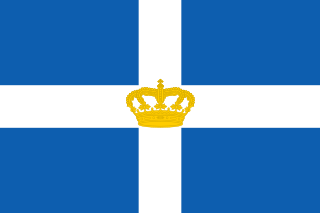
The Kingdom of Greece was established in 1832 and was the successor state to the First Hellenic Republic. It was internationally recognised by the Treaty of Constantinople, where Greece also secured its full independence from the Ottoman Empire after nearly four centuries.
Bibliography of science fiction, fantasy, historical fiction and nonfiction writer Harry Turtledove:















